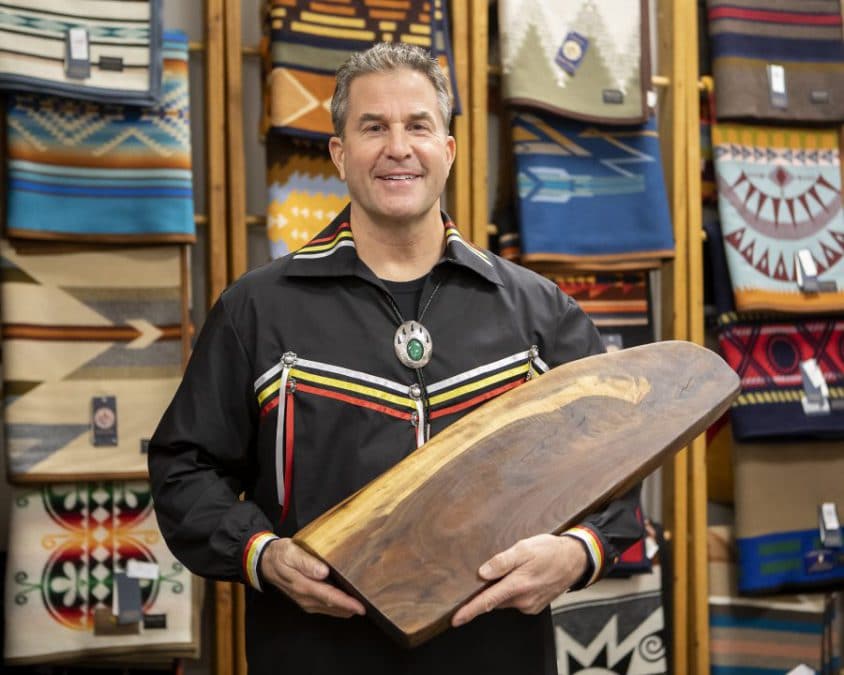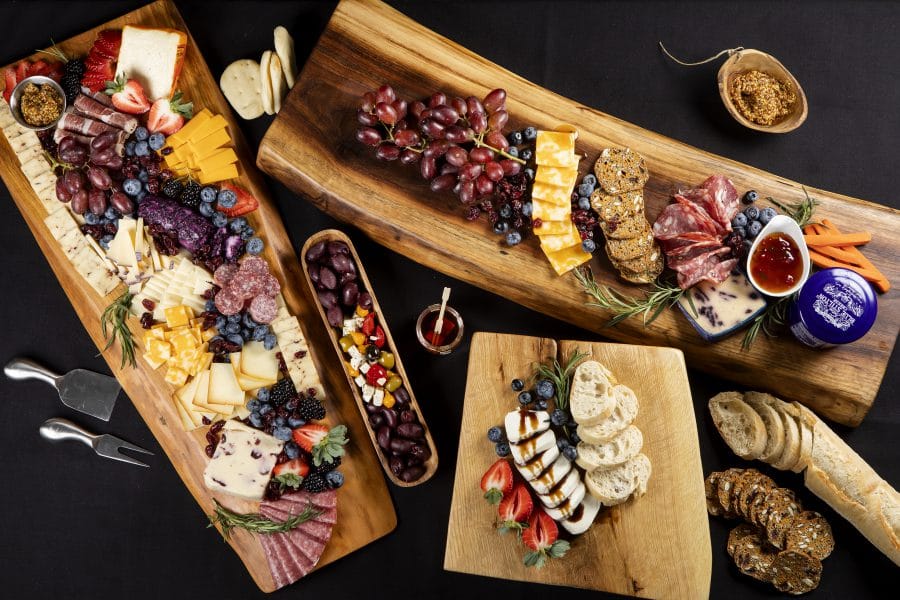Kevin Roberts — Kakingeshi (Grizzly Bear) — breathes new life into timber that others may only see useful as firewood, not as end tables, benches or art. But Roberts looks at wood through a different lens for his furniture and décor company, Migwetch Mtek Designs.
“I’ve always had an admiration and a really sincere appreciation for nature,” Roberts said.

Hunting, fishing and exploring the spring-fed creeks and rivers in Missouri were his favorite youth pastimes. However, Roberts’s career and other obligations made it difficult to spend time enjoying the outdoors as an adult. Now retired, Migwetch Mtek offers him the opportunity to reconnect with Mother Nature through creating one-of-a-kind pieces of art.
“I’m saving and using the wood for a useful purpose, and I feel like I am bringing nature’s natural beauty and serenity indoors,” Roberts said. “And people can use it and enjoy it in whatever capacity they want to use it as opposed to the wood just being turned into mulch, firewood or letting it be destroyed otherwise.”
Uncovering new branches
Roberts is a Bertrand family descendant, and although his mother did not know much about their Potawatomi heritage, she made it a priority to inform her children from an early age about their ancestry.
“When we were little, and (mom) would put us to bed, she’d always make a peace sign gesture with her hand. And she’d say, ‘That’s what the Potawatomi would say.’ We’d always chuckle, but she’d go, ‘Well, that’s all I know. You’re part Potawatomi.’ And it was something I always thought about — why didn’t she know any more about our Potawatomi heritage?” he asked.
While living in Kansas, Roberts stopped by the Prairie Band Potawatomi Nation to learn more about the history of Potawatomi in the area and for potential clues to his heritage. During that trip, he became aware of his family’s association and enrollment with the Citizen Potawatomi Nation.
“That’s really what started my excitement about my heritage and hunger to learn more. I started researching my grandparents, then of course, the family ancestry,” he said.
Roberts met another CPN member residing in Kansas, Gladys Moeller, who had done extensive research on many Potawatomi families, including the Bertrands, which helped him create a detailed family tree.
“She had numerous filing cabinets in her house full of research on various families and information she had compiled over the years, all tied to the Potawatomi,” Roberts explained.
“She helped me find pictures of relatives that my mom hadn’t even seen.”
Although his mother was not able to share much about their Potawatomi roots, Roberts now ensures future generations of his family know their heritage and incorporates traditions into family gatherings.
“I have three adult children, and I keep encouraging them to find time in their busy schedules to read the information I share with them and access the CPN online resources” Roberts said. “I summarize information from the lessons and insights that Justin (Neely) publishes. And with the online dictionary and all the resources we have now on the CPN’s website, it’s really helpful and exciting to learn about our people, culture, and our language.”
Beginnings
Roberts’s desire to learn more about his Potawatomi culture and the language inspired the name of his design company: Migwetch Mtek (Thank You Tree).
“In one lessons, the word tree — mtek — was included, and I thought, ‘That’s what I am going to use.’ I added Migwetch, the word for ‘thank you,’ and it seemed like the perfect fit for what I do in my work. I routed it around to my children and said, ‘What about this?’ and it stuck,” he said.
While his children were in college, his youngest daughter asked him about using extra logs from the neighbor’s tree they had to cut down to create end tables for her apartment.
“It just caught on where friends of theirs would say, ‘Can you make me some of those?’ And then the parents would see them when the kids would come home. I didn’t have enough wood,” he said and laughed. “I had to go out and find it.”
Process
Word of mouth continues to help business. Roberts made connections with farmers and companies across the Midwest to obtain material he reclaims into benches, charcuterie boards, end tables and more. Although he lives in Illinois, he drives as far as Colorado and frequents the area where he grew up in central Missouri to search through sawmill scrap piles.

“They’ve been there probably 100 years because when I was a little boy, that’s where my parents would take us to pick up firewood,” he said. “But I’ll go and spend a day or so, digging through their wood pile to find these imperfections in discarded wood scraps that I turn into decorative art.”
He often hears customers comment on how he highlights the wood’s beauty through nature’s flaws. After finding the perfect pieces of reclaimed timber, he sands and polishes each piece before using oil or a wax sealer as the finishing touch.
“Nature makes it. There’s no man-made element of creating or crafting the natural beauty of my products,” he explained. “It’s nature’s defects and imperfections I am leveraging. It’s normal decay, weathering and exposure — an exposed burl or some natural imperfection that makes my decorative art pieces unique.”
When out marketing his creations, Roberts takes every opportunity to share our Potawatomi culture with others.
“I enjoy and am able to engage in dialog around the Potawatomi, sharing information about our heritage and culture. Of course, you get the proverbial,‘What’s a Potawatomi?’ Because some people have heard about our people and some haven’t,” he said. “I usually respond initially with, ‘Well, you are looking at one.’”
Roberts’s organic approach to his business reflects traditional, fundamental worldviews of the Potawatomi people and humanity’s role in protecting segmekwé (Mother Earth) for generations to come.
“I have a better appreciation for life and purpose,” he said. “I feel like I am connected to nature and really kind of being a good steward and taking care of what’s afforded to us as a people — a people entrusted to care for it as opposed to destroying it.”
Potawatomi Gifts currently has a small, limited number of Migwetch Mtek charcuterie boards for sale. Check them out at potawatomigifts.com and follow Migwetch Mtek on Facebook at facebook.com/migwetchmtek and Instagram at instagram.com/migwetchmtek.
